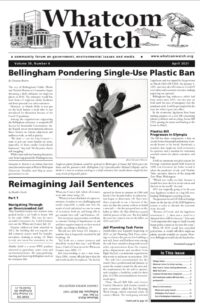Since January 2014, Whatcom Watch has been rerunning articles from issues printed 20 years ago. The below article appeared in the April 2001 issue of Whatcom Watch.
by Daniel M. Warner
Accountability, Carpenter Wages
At the February 20, 2001 comment period two people spoke.
John Servais asked, regarding the port:
1. Is there local accountability? He said the port competes with local business and deals too much with nonlocal firms promoting the welfare of large corporations, and the port does not deal enough with local business.
2. Is there environmental responsibility? He said the port is not environmentally sensitive: witness such projects as the toxic dump in the bay and selling real estate to the SE2 owners.
3. Is there fiscal prudence? He said there are “buckets-full of waste” and that the port sells land at fire sale prices instead of market value.
Mr. Servais gave the commissioners a letter detailing his concerns, and the commission asked that the staff examine his letter and be prepared to specifically address his complaints.
A second person spoke. Eric Franklin is the director of organizing for the Pacific Northwest Regional Council of Carpenters, representing union carpenters. He complained that, while the port pays the “prevailing wage” for carpenters on its own projects ($30-32 an hour including benefits), it allows its tenants to hire carpenter services at $10-12 an hour with no benefits. This is not, Mr. Franklin said, a living wage.
And, to the assertion that effectively requiring the port to pay a prevailing wage on all its properties would cost the taxpayers more, Mr. Franklin said that the taxpayer eventually picks up the tab for those without income security in such forms as welfare, uninsured hospitalizations, public funding of pensions, and so on. The commission directed staff to check into these complaints.
Trash, Security and Lighting
At the March 6, 2001 comment period, three people spoke.
Warren Hansen is a live-aboard. (He lives on his boat at the Marina — lots of folks do!) He had concerns about trash removal and security, and said he wishes the port would hire a harbormaster who knows about harbors.
John Servais reminded the commissioners of what he presented last time (See Feb. 20 comment period), and distributed several pages — a questionnaire for contractors — that might partially address the issue of tenants on port-owned property paying their skilled tradespeople less than a living wage.
Jan Willing grilled the commissioners again (see Whatcom Watch, March 2001) on issues of trespass light. What has the port done to insure that tenants comply? Will the hotel and the Paulson Bldg. come into the compliance study promised? Are new lights to be fully shielded?
At first the commissioners bristled; Commissioner Ginny Benton asked Ms. Willing if she (Jan) knew the difference between “comment period” and “interrogation,” and informed Ms. Willing that the commissioners were not seated to be interrogated. However, the tone soon became more friendly. Commissioner Douglas Smith avuncu-larly observed that “progress” has degraded the quality of life where he lives, so it is not surprising that others, like the Willings, should experience the same.
Director Jim Darling updated everyone on the lighting status. The port advertised for a lighting-review consultant to review the harbor light system, to develop standards for appropriate lighting, and to retrofit lights as feasible. Commissioner Scott Walker said that no matter what exactly came of the port’s efforts on lighting, there had been “a sea-change on how the port thinks about light” as a result of the Willings’ (and others’) comments over the years, “a significant new sensitivity.”
Harbor Lighting
At the March 20, 2001 meeting, outdoor lighting was again discussed.
In response to complaints by neighbors, the port has engaged the services of a Seattle consulting firm, Candela. The firm will conduct a thorough inventory of the port’s present lighting, make recommendations for retrofitting where feasible, suggest standards for future lighting, and work with the port to adjust present lights so as to minimize “light trespass.” The price of the contract was not discussed at the short work-session devoted to it.
The commissioners again thanked Peter and Jan Willing (Jan was present) and others for having been persistent in their concern and for having “sensitized the commissioners to the lighting issue at the port and in general.” Commissioners Douglas Smith and Scott Walker promised that they would continue to pay attention to this matter.




























